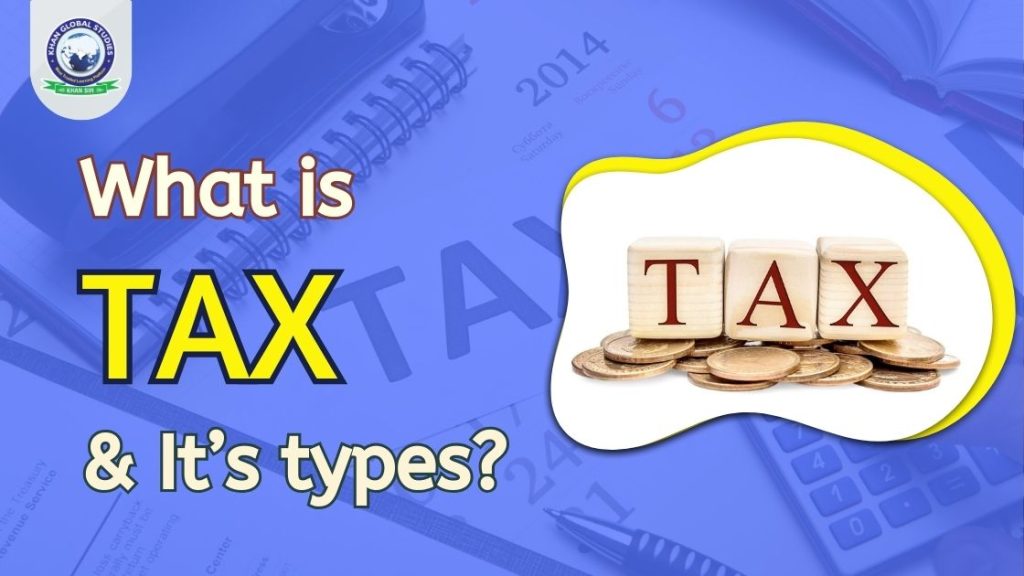Tax is a mandatory expenditure imposed on an individual by the state and central government. It is one of the most important sources of income for the government which helps them build the country’s economy and infrastructure. In this article, we will know what is tax and its types.
Therefore, to be a responsible citizen, you must pay taxes. However, it is also important to know the different types of taxes applicable in the taxation system of India.
What is Tax?
The term tax comes from the Latin word “taxo”. Tax is a mandatory fee or financial charge imposed by the government on an individual or institution to raise revenue. The total amount of tax collected is used for various public programs. According to the law, non-payment of tax voluntarily or by mistake may result in penalty or punishment.
Types of Tax
Individuals/organizations have to pay taxes in various ways. Taxes are divided into direct tax and indirect tax depending on the method of tax payment by the tax authorities. The information about both taxes is as follows.
- Direct Tax
- Indirect Tax
Direct Tax
Direct taxes are taxes that are paid directly by you. These taxes are imposed directly on an entity or individual and cannot be transferred to anyone else. The body that administers these direct taxes is the Central Board of Direct Taxes (CBDT) which is part of the Department of Revenue. To help in its duties, it supports various functions that regulate various aspects of direct taxes.
Some of these acts are
Income Tax Act:
It is also known as the IT Act of 1961 and sets out the rules governing income tax in India. Income can come from any source such as business, ownership of a house or property, profit from investments and salary etc. This is the act that determines how much tax benefit there will be on fixed deposits or life insurance premiums. This Act also determines how much income you can save through investment and what will be the income tax slab.
Wealth Tax Act:
In 1951, the Wealth Tax Act was enacted and it regulates the taxation of the net wealth of an individual, company or Hindu undivided family. The simplest calculation of wealth tax was that if the net worth was Rs. 30 lakhs, then Rs. 1% of the amount above Rs 30 lakh had to be paid as tax. It was scrapped in the budget announced in 2015. This was later replaced by a surcharge and a surcharge of 12% has been imposed on individuals earning Rs. They are earning more than Rs 1 crore. This also applies to companies whose annual income is less than Rs. This is more than 10 crores. The new guidelines have significantly increased the amount of tax to be collected by the government as it will collect money through a wealth tax.
Gift Tax Act:
The Gift Tax Act came into force in 1958 and states that if a person receives anything, monetary or valuable, as a gift, he has to pay tax on such gifts. The government had set a 30% tax on such gifts but abolished it in 1998. Initially, if someone received any gift, which could be property, jewellery, shares etc., it was taxable. According to the new rules, gifts from family members such as brothers, sisters, parents, husbands, aunts and uncles will not be taxable. Even gifts you receive from local authorities are exempted from this tax. Now how will this tax work if someone other than exempted entities gifts you any item worth more than Rs. If it exceeds Rs 50,000 then the entire gift amount will be taxable.
Expenditure Tax Act:
This Act came into existence in 1987 and it deals with how much you as an individual spend when availing the services of a hotel or restaurant. It applies to the entire India except Jammu and Kashmir. It says that if all the expenses incurred in hotels and restaurants are Rs. Certain expenditures are taxable under this Act if they exceed Rs 3,000.
Interest Tax Act:
The Interest Tax Act of 1974 deals with tax payable on interest earned in certain specified circumstances. The last amendment to the Act stated that the Act does not apply to interest earned after March 2000.
Examples of Direct Tax
These are some of the Direct Taxes you pay:
a) Income Tax
B) Capital Gains Tax
c) Securities Transaction Tax
d) Excess Profits Tax
E) Corporate Tax
Indirect Taxes
The definition states that indirect taxes are taxes imposed on goods or services. They differ from direct taxes because the government does not impose them directly on the person paying them. Instead, the government imposes them on the product and an intermediary, the person selling the product, collects them. VAT (Value-Added Tax), tax on imported goods, sales tax etc. are the most common examples of indirect taxes. These taxes increase the cost of the service or product because they increase the price.
Examples of Indirect Tax
These are some of the common Indirect Taxes you pay.
A) Sales Tax
B) Service Tax
GST – Goods and Services Tax
The Goods and Services Tax (GST) is the biggest reform in India’s indirect tax structure since its implementation nearly 25 years ago. GST is a consumption-based tax, as it is applicable where consumption occurs. It is imposed on value-added goods and services at each stage of consumption in the supply chain. GST payable on purchase of goods and services Unlike GST payable on supply of goods and services, the trader will pay the applicable GST rate but can claim it back through the tax credit mechanism.
C) Value-Added Tax (VAT)
D) Customs Duties and Tolls
E) Excise Duty
Other Taxes
- Entry Tax
- Professional tax
- Property Tax – Municipal Tax
- Entertainment
- Stamp duty, Registration Fee, Transfer Tax
- Education Cess/Surcharge
- Gift Tax
- Wealth Tax
- Toll Tax and Road Tax
- Swachh Bharat Cess
- Agricultural Welfare Cess
- Infrastructure Cess
Benefits of Paying Taxes
Taxes are the amount of money that the government uses to run and provide public services to its citizens. Following are the benefits of paying tax.
- Your tax payment ensures that the services provided by the government to all citizens continue without any interruption.
- You can use your income tax return documents to apply for a loan or credit card.
- With this tax amount, the government can fund better facilities and utilities for its citizens which in turn helps in improving the standard of living of the people.
- The government has a lot of work to do and it needs money. Your money also goes to armies, infrastructure development, security of citizens, administrative services etc.



